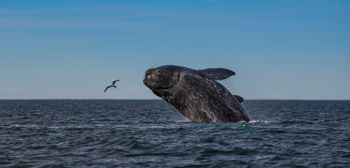Moulton, Rutherford Lead Bipartisan Effort in Congress to Save Right Whales

WASHINGTON—March 7, 2019, Representatives Seth Moulton (MA-06) and John Rutherford (FL-04) reintroduced the Scientific Assistance for Very Endangered (SAVE) Right Whales Act. Representatives Bill Keating (MA-09), Jared Huffman (CA-02), and Rep. Bill Posey (FL-08), joined them as original sponsors.
According to the Anderson Cabot Center for Ocean Life at the New England Aquarium, the North Atlantic right whale is one of the rarest whales in the world. Today, only about 425 North Atlantic Right Whales remain. The SAVE Right Whales Act of 2019 would create government grants that states, non-profits, and members of the fishing and marine shipping industries can use to fund research and efforts that restore the North Atlantic right whale population.
“We humans have nearly killed every right whale in existence through our direct and indirect actions over the past two centuries.” Moulton said. “Now we have a choice:we can be the generation that brings the right whale back, or the generation that allows their extinction. Let’s not miss this unique moment. Passing the SAVE Right Whales Act is the first of many steps that Congress should take to help restore the right whale population.”
“The North Atlantic right whale is on the brink of extinction. We must empower scientists, fishermen, and government to work together to find innovative solutions to rebuild this marine mammal species,” Rutherford said. “The loss of the right whale would disrupt the entire ocean ecosystem – upsetting fish stock viability, tourism, and our coastal economies that rely on healthy oceans. I am proud to team up with my congressional colleagues on this important mission.”
“With fewer than 425 right whales remaining, we must do everything we can to save them from extinction,” said Huffman. “This issue is critically important, which is why I’m convening a hearing this week in the Water, Oceans, and Wildlife subcommittee to dig deeper into the many threats facing the right whale and hear from experts on the best path forward. I’m grateful to join Rep. Moulton in introducing his SAVE Right Whales Act, which supports research and new technology development so that we can find solutions to save this iconic species.”
“This bill is an important step in protecting and restoring the population of our right whales. Florida is home to diverse marine wildlife which is critical to maintaining the balance of our delicate ecosystem. It’s something we all depend on,” said Posey.
In addition to the grants, the bill would fund government research to track plankton, the whales’ main source of food. According to Defenders of Wildlife, a 70-ton right whale eats about 2,600 pounds of zooplankton per day during peak feeding season. Researchers want to learn more about how human actions affect zooplankton, which in turn affects the health and migration patterns of the whales.
Today’s bill reintroduction comes in the middle of right whale calving season. Scientists in Florida and Georgia, have spotted seven right whale calves so far this year. This is good news after last year, when no calves were spotted and an estimated 17 adult right whales died. According to Defenders of Wildlife, right whales only give birth every four years, and they are not able to reproduce until age eight. So, a single death among the whales able to reproduce threatens the entire species.
The House Committee on Natural Resources will hold a hearing examining threats to the North Atlantic right whales this morning. A livestream will be available here starting at 10:00 AM EST.
In addition to bipartisan support in Congress, the SAVE Right Whales Act has support from scientists, conservationists, and fishermen from across the country.
